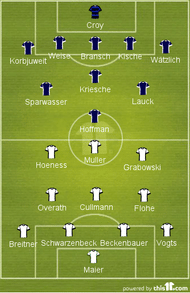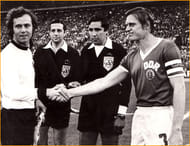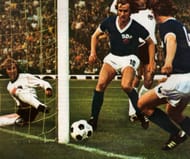The law of the universe dictates that everything must have an opposite. There has to be a ‘ying’ to every ‘yang’. A ‘this’ to every ‘that’. A male for a female, a touch of black for a hint of white, a proton for an electron, and a communist for every democrat.
While the last one may not hold true after the collapse of the Soviet Union, 1974 was a world apart from 2014. 40 years ago, the world as we know it had been rented into two halves due to their diametrically opposing political ideologies. And whenever these two ideologies met each other, it was as if matter and anti- matter were coming into contact and negating each other in a fierce explosion. It was as if the entire fabric of the universe would collapse under the duress of the clash.
And one of the very few clashes between the communists and the democrats on the football pitch was in the 1974 World Cup game between East and West Germany, in which the hosts and subsequent World Cup winners, West Germany, were stunned by their communist brothers in front of a 60,000 strong crowd at Hamburg.
The World
While the ‘Cold War’ between the USSR and the USA had led to confrontations all over the world, in Europe, there weren’t quite as many actual clashes between troops. Yet, Germany, which had been carved into two countries, West and East, and had been occupied by different superpowers during the aftermath of the 2nd World War, was one of the most tense regions around the world.
And thanks to the different forms of governance introduced in each half of Germany by the Americans and the Soviets, the countries couldn’t see eye-to-eye with each other on anything, which, sadly for peace lovers, encompassed the beautiful game of football.
While West and East Germany had clashed with each other on a few occasions before 1974 (most of them matches between their amateur teams for the Olympic qualifiers), it had always been a very hush-hush affair; a game played in an indoor stadium with no journalists or fans allowed inside.
But 1974 was, in every sense of the word, a world apart, since this was the first (and last) time these two teams were going to meet at a World Cup, and on West German soil at that. It was going to be the first and the last time the world would witness a football game as tense and as important as this one; the possible real-life repercussions were not easy to fathom.
The fixture
While the social and the political situations were extremely tense, the match, taken out of the political context, was a rather dull match-up. Both the Western and Eastern halves of Die mannschaft had already qualified for the knockout stages. The West Germans had romped past Chile (1-0) and Australia (3-0), and the East Germans had defeated Australia (2-0) and held Chile to a tie (1-1). Since Australia and Chile drew 0-0, this game was just a formality of a fixture between two teams that had already qualified, at the very end of the group stages.
This fixture, however, was going to decide the group winner, and both teams wanted to win the game, not just because their respective nations had bad blood between them, but also because topping the group generally meant having the privilege of facing a weaker opponent in the knockout stage. So both teams had a logical reason to give it their all, that is if the political pressure they were facing wasn’t enough. This wasn’t going to go down well.
The teams
The West German team, who were the European Champions at the time, comprised of legends such as Franz Beckenbauer, Sepp Maier and striker extra-ordinaire Gerd Muller, who were all members of the reigning European club, Bayern Munich, at the time of the match. Other influential players included Uli Hoeness, Paul Breitner and Wolfgang Overath, who were all very influential players in Germany.
The entire West German team was very used to the pressure that traditionally accompanies big international games, and they had many veterans, including experienced coach Helmut Schon, on their side. Schon, who was born in Dresden in East Germany, wanted the West Germans to win really badly. Going into the game, their captain Beckenbauer urged his team on by stating that they were “playing this for Schon”
While East Germans were definitely the underdogs going into the game, their team had no dearth of talent, with all of their players representing the traditional powerhouses of the now-defunct East German league, with their goal scorer of the game, Sparwasser, representing the European Cup winners FC Magdeburg. They did, however, lack big game experience in their national colors, since most of their players had represented their nation only in the Olympics as amateurs.
The communists had always placed a lot of emphasis on sports, and their excellent displays in the Olympics only proved that point further. For them, victory in sporting events was just another way to showcase their superiority over their democratic counterparts, who were generally better off economically.
As a result, the players, who were already considered rather inexperienced, had even more pressure on their shoulders, since they had the responsibility of proving communist superiority, or they had to suffer the consequences of incurring the displeasure of a totalitarian government.
Kick Off
The game kicked off amidst the roar and tension that had built up within the 60,000 fans that were packed into the Volksparkstadion, out of which 1,500 were the hand-picked ‘fans’ from Communist East Germany, chosen specially to cheer their team on.
The players weren’t impervious to pressure despite their mental fortitude, and most approached the game very apprehensively indeed. The game was clearly one played with caution and mutual respect, as there were hardly any rash tackles or attempts on goal. The first half didn’t see any players get booked, for everyone was too scared to start a full-scale communist-democrat riot in the middle of Hamburg.
The East Germans were far better organized than the West Germans had expected, and their only real chance was a Gerd Muller strike which ended up hitting the woodwork. For East Germany, there weren’t many realistic chances either, except for the header which Kreische fluffed, sending the ball sailing over Sepp Maier’s goal.
Half Time
As the game dragged on, West Germany looked as if they were willing to settle for a draw. A draw would mean that the West Germans would top the group, and they would be the ones having all the bragging rights. But for the East Germans, a draw would mean bringing shame to their country, and its government as well, which was the biggest no-no one could have come across. While the West Germans played like a team that had already settled for level pegging, their Eastern brothers fought tooth and nail to score a goal.
The game started getting increasingly rough after the 70th minute, because of the tenacity with which the East Germans fought. Uruguayan referee Ramón Barreto Ruiz had to show the yellow card to Jürgen Sparwasser due to the latter’s increasingly aggressive style of play, but the East Germans had more than just a game on the line; it was far more important to them.
Sparwasser’s aggression and the West Germany’s lethargy could only end badly for the West Germans, and badly it did end. Erich Hamman picked the ball up and dashed for 30-yards, completely unchallenged, before Franz Beckenbauer stumbled into a defensive stance. By then it was already too late; Hamman had wafted in a delicate cross for Sparwasser, who had torn past 3 German defenders and blasted the ball past a hapless Maier.
The West German crowd and player went into a frenzy and went for as many last ditch attempts as possible to get back into the game, but the East Germans had completely sealed their goal down. Two more East Germans went on to receive yellow cards, but no more goals were scored. The East Germans had triumphed in their one and only professional game versus the West Germans.
The winning goal went on to become one of the most iconic goals of all time, even though it was merely a game in the group stages. Sparwasser later said that “If one day my gravestone simply says ‘Hamburg 74’, everybody will still know who is lying below”. The goal sank more than just the West German armada. It had punched a hole in the armory of the democrats. The communists had won a resounding battle in the ongoing Cold War.
Aftermath
Following the game, the players were too scared to show signs of acceptance towards each other, and walked off into the tunnel without exchanging even words or glances, let alone jerseys. While the East Germans celebrated their win, the West was shaken to no end. Their manager, who really wanted to win the game because of his beef with East Germany, the country which he had to flee from after the 2nd World War, suffered a serious meltdown. Captain Franz Beckenbauer had to lead his team from that point, and had to inspire them to bounce back after suffering a mental setback.
Ironically, winning the game and topping the group didn’t go well for the East Germans, since they were pitted against powerful opponents such as the Netherlands and Brazil, who proceeded to knock them out of the tournament in the very next round. On the other hand, West Germany enjoyed a relatively easier group, which gave them some of their lost confidence back.
They went on to win the tournament in stunning fashion, beating Johann Cruyff’s Netherlands with a 2-1 score, but Beckenbauer clearly stated that the World Cup was theirs only because of the much needed wake-up call East Germany had given them in stunning fashion.
While most assumed that winning the cup would erase the bitter memories of the loss against their brothers, that was not to be the case, as the game went down in German history as one of their most embarrassing defeats. The West Germans never actually faced the East Germans again, and after the Berlin wall fell and the two halves of Germany were reunited, the possibility of a retribution was completely eliminated.
While many had assumed that this game might lead to conflicts in the real world, that, fortunately, was not to be the case. And despite the strict East German rules against association with the West German players, Sparwasser and Breitner, out of mutual respect for each other, exchanged their jerseys away from the prying eyes while they were in the tunnel. I believe that goes on to show that despite all the conflict, all the animosity in the world, even the most bitter of enemies, can be brought together by a power more unifying than any other. The power that is football.



